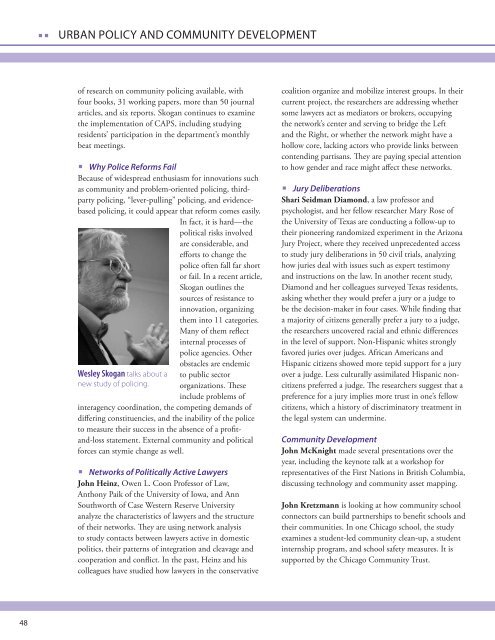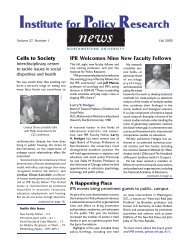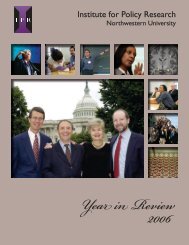IPR - Institute for Policy Research - Northwestern University
IPR - Institute for Policy Research - Northwestern University
IPR - Institute for Policy Research - Northwestern University
You also want an ePaper? Increase the reach of your titles
YUMPU automatically turns print PDFs into web optimized ePapers that Google loves.
Urban policy and Community Development<br />
of research on community policing available, with<br />
four books, 31 working papers, more than 50 journal<br />
articles, and six reports. Skogan continues to examine<br />
the implementation of CAPS, including studying<br />
residents’ participation in the department’s monthly<br />
beat meetings.<br />
< Why Police Re<strong>for</strong>ms Fail<br />
Because of widespread enthusiasm <strong>for</strong> innovations such<br />
as community and problem-oriented policing, thirdparty<br />
policing, “lever-pulling” policing, and evidencebased<br />
policing, it could appear that re<strong>for</strong>m comes easily.<br />
In fact, it is hard—the<br />
political risks involved<br />
are considerable, and<br />
ef<strong>for</strong>ts to change the<br />
police often fall far short<br />
or fail. In a recent article,<br />
Skogan outlines the<br />
sources of resistance to<br />
innovation, organizing<br />
them into 11 categories.<br />
Many of them reflect<br />
internal processes of<br />
police agencies. Other<br />
Wesley Skogan talks about a<br />
new study of policing.<br />
obstacles are endemic<br />
to public sector<br />
organizations. These<br />
include problems of<br />
interagency coordination, the competing demands of<br />
differing constituencies, and the inability of the police<br />
to measure their success in the absence of a profitand-loss<br />
statement. External community and political<br />
<strong>for</strong>ces can stymie change as well.<br />
< Networks of Politically Active Lawyers<br />
John Heinz, Owen L. Coon Professor of Law,<br />
Anthony Paik of the <strong>University</strong> of Iowa, and Ann<br />
Southworth of Case Western Reserve <strong>University</strong><br />
analyze the characteristics of lawyers and the structure<br />
of their networks. They are using network analysis<br />
to study contacts between lawyers active in domestic<br />
politics, their patterns of integration and cleavage and<br />
cooperation and conflict. In the past, Heinz and his<br />
colleagues have studied how lawyers in the conservative<br />
coalition organize and mobilize interest groups. In their<br />
current project, the researchers are addressing whether<br />
some lawyers act as mediators or brokers, occupying<br />
the network’s center and serving to bridge the Left<br />
and the Right, or whether the network might have a<br />
hollow core, lacking actors who provide links between<br />
contending partisans. They are paying special attention<br />
to how gender and race might affect these networks.<br />
< Jury Deliberations<br />
Shari Seidman Diamond, a law professor and<br />
psychologist, and her fellow researcher Mary Rose of<br />
the <strong>University</strong> of Texas are conducting a follow-up to<br />
their pioneering randomized experiment in the Arizona<br />
Jury Project, where they received unprecedented access<br />
to study jury deliberations in 50 civil trials, analyzing<br />
how juries deal with issues such as expert testimony<br />
and instructions on the law. In another recent study,<br />
Diamond and her colleagues surveyed Texas residents,<br />
asking whether they would prefer a jury or a judge to<br />
be the decision-maker in four cases. While finding that<br />
a majority of citizens generally prefer a jury to a judge,<br />
the researchers uncovered racial and ethnic differences<br />
in the level of support. Non-Hispanic whites strongly<br />
favored juries over judges. African Americans and<br />
Hispanic citizens showed more tepid support <strong>for</strong> a jury<br />
over a judge. Less culturally assimilated Hispanic noncitizens<br />
preferred a judge. The researchers suggest that a<br />
preference <strong>for</strong> a jury implies more trust in one’s fellow<br />
citizens, which a history of discriminatory treatment in<br />
the legal system can undermine.<br />
Community Development<br />
John McKnight made several presentations over the<br />
year, including the keynote talk at a workshop <strong>for</strong><br />
representatives of the First Nations in British Columbia,<br />
discussing technology and community asset mapping.<br />
John Kretzmann is looking at how community school<br />
connectors can build partnerships to benefit schools and<br />
their communities. In one Chicago school, the study<br />
examines a student-led community clean-up, a student<br />
internship program, and school safety measures. It is<br />
supported by the Chicago Community Trust.<br />
48
















